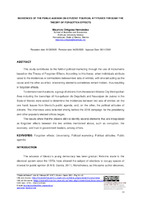| dc.rights.license | Licencia de Creative Commons Reconocimiento-NoComercial-CompartirIgual 4.0 Internacional (CC BY-NC-SA 4.0) | |
| dc.creator | Ortigosa Hernández, Mauricio | |
| dc.date.accessioned | 2021-03-12T15:18:57Z | |
| dc.date.available | 2021-03-12T15:18:57Z | |
| dc.date.issued | 2021-01-29 | |
| dc.identifier.citation | Ortigosa Hernández, M. (2021). Incidences of the public agenda on citizens’ political attitudes through the theory of forgotten effects. Visión de Futuro, Revista Científica. Posadas (Misiones): UNaM. FCE. PPA; 25(1), 24-42. | es_AR |
| dc.identifier.issn | 1668-8708 | |
| dc.identifier.other | VF-058 | |
| dc.identifier.uri | https://hdl.handle.net/20.500.12219/2820 | |
| dc.identifier.uri | https://doi.org/10.36995/j.visiondefuturo.2021.25.01.001.en | |
| dc.identifier.uri | https://visiondefuturo.fce.unam.edu.ar/index.php/visiondefuturo/article/view/432/317 | |
| dc.description | Fil: Ortigosa Hernández, Mauricio. Anáhuac University Mexico. School of Business and Economics; Mexico. | |
| dc.description.abstract | This study contributes to the field of political marketing through the use of instruments based on the Theory of Forgotten Effects. According to this theory, when individuals attribute value to the incidences or connections between two sets of entities, with one set acting as the cause and the other as effect, intervening elements sometimes remain hidden, thus resulting in forgotten effects. To demonstrate the above, a group of citizens from the western Mexico City Metropolitan Area including the townships of Huixquilucan de Degollado and Naucalpan de Juárez in the State of Mexico were asked to determine the incidences between two sets of entities: on the one hand, issues from Mexico’s public agenda, and, on the other, the political attitudes of citizens. The interviews were collected shortly before the 2018 campaign for the presidency and other popularly elected offices began. The results show that the citizens did not identify several elements that are interpolated as forgotten effects between the two entities mentioned above, such as corruption, the economy, and trust in government leaders, among others. | en |
| dc.format | application/pdf | |
| dc.language.iso | eng | en |
| dc.publisher | Universidad Nacional de Misiones. Facultad de Ciencias Económicas. Programa de Posgrado en Administración | es_AR |
| dc.rights.uri | http://creativecommons.org/licenses/by-nc-sa/4.0/ | |
| dc.source | Visión de Futuro (Misiones), 1-2021; 25(1): pp. 24-42. https://visiondefuturo.fce.unam.edu.ar/index.php/visiondefuturo/index | |
| dc.subject | Forgotten effects | en |
| dc.subject | Uncertainty | en |
| dc.subject | Political marketing | en |
| dc.subject | Political attitudes | en |
| dc.subject | Public agenda | en |
| dc.title | Incidences of the public agenda on citizens’ political attitudes through the theory of forgotten effects | en |
| dc.type | info:eu-repo/semantics/article | |
| dc.type | info:ar-repo/semantics/artículo | |
| dc.type | info:eu-repo/semantics/publishedVersion | |




